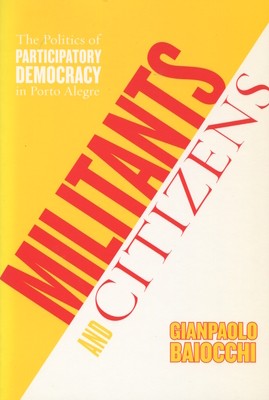
- We will send in 10–14 business days.
- Author: Gianpaolo Baiocchi
- Publisher: Stanford University Press
- ISBN-10: 0804751226
- ISBN-13: 9780804751223
- Format: 15.8 x 23.6 x 1.9 cm, hardcover
- Language: English
- SAVE -10% with code: EXTRA
Reviews
Description
Brazil's democracy has frequently been described as unconsolidated, its citizens as apathetic and uninterested in politics. But in Porto Alegre, a host city to the World Social Forum, thousands of ordinary citizens participate in local governance, making binding decisions on urban policy on a daily basis. While there has been immense attention paid to the practice of participatory democracy in Porto Alegre, this is the first book to examine the politics, culture, and day-to-day activities of its citizens.
Drawing on the rich tradition of urban ethnography and political theory, the book argues that Porto Alegre's importance may lie not just with its effective governance, but with its new political logic, namely a greater access to government functions and government officials for traditionally disenfranchised citizens. In an age characterized by seemingly strong voter apathy, this study has global implications. The author shows that in the discussions on the failings of democracy in industrialized countries like the United States, most people may be missing what is central to civic engagement-unimpeded access to government.
EXTRA 10 % discount with code: EXTRA
The promotion ends in 19d.06:38:41
The discount code is valid when purchasing from 10 €. Discounts do not stack.
- Author: Gianpaolo Baiocchi
- Publisher: Stanford University Press
- ISBN-10: 0804751226
- ISBN-13: 9780804751223
- Format: 15.8 x 23.6 x 1.9 cm, hardcover
- Language: English English
Brazil's democracy has frequently been described as unconsolidated, its citizens as apathetic and uninterested in politics. But in Porto Alegre, a host city to the World Social Forum, thousands of ordinary citizens participate in local governance, making binding decisions on urban policy on a daily basis. While there has been immense attention paid to the practice of participatory democracy in Porto Alegre, this is the first book to examine the politics, culture, and day-to-day activities of its citizens.
Drawing on the rich tradition of urban ethnography and political theory, the book argues that Porto Alegre's importance may lie not just with its effective governance, but with its new political logic, namely a greater access to government functions and government officials for traditionally disenfranchised citizens. In an age characterized by seemingly strong voter apathy, this study has global implications. The author shows that in the discussions on the failings of democracy in industrialized countries like the United States, most people may be missing what is central to civic engagement-unimpeded access to government.


Reviews